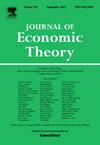市场紧度在逆向选择竞争均衡中的筛选作用
IF 1.2
3区 经济学
Q3 ECONOMICS
引用次数: 0
摘要
本文回顾了Guerrieri, Shimer, and Wright (2010) (GSW)在逆向选择竞争搜索市场中的筛选研究。GSW表明存在一种独特的分离均衡,其中每种类型适用于不同的契约,其关键排序假设涉及代理偏好的单交叉特性。我们发现,GSW的主要结果是在偏好异质性较弱的假设下成立的,即广义排序假设,而弱化排序假设依赖于明确考虑市场紧缩的筛选作用。如果我们假设代理的匹配概率在市场紧俏时严格增加,则可以进一步削弱这一假设。除了提供理论见解外,我们还研究了一些例子,以证明广义分类如何有助于研究搜索和信息摩擦下的市场不完善性。在我们的例子中,不可分割性、价格限制和最低工资违反了GSW的分类假设,但在广义分类下仍然是可处理的。因此,本文的另一个贡献是扩展了GSW方法的适用性。本文章由计算机程序翻译,如有差异,请以英文原文为准。
The screening role of market tightness in a competitive search equilibrium with adverse selection
This paper revisits Guerrieri, Shimer, and Wright (2010) (GSW) to study screening in a competitive search market with adverse selection. GSW show that there exists a unique separating equilibrium in which each type applies to a different contract, and their key sorting assumption involves a single-crossing property on agents' preferences. We show that GSW's main results hold under a weaker assumption on preference heterogeneity, called generalized sorting, and weakening the sorting assumption relies on explicitly considering the screening role of market tightness. The assumption can be weakened further if we assume that agents' matching probability strictly increases in market tightness. In addition to providing theoretical insights, we study examples to demonstrate how generalized sorting facilitates the study of market imperfections under search and informational frictions. In our examples, indivisibility, price limits, and the minimum wage violate GSW's sorting assumption but remain tractable under generalized sorting. Thus, an additional contribution of this paper is the expansion in applicability of GSW's approach.
求助全文
通过发布文献求助,成功后即可免费获取论文全文。
去求助
来源期刊

Journal of Economic Theory
ECONOMICS-
CiteScore
2.50
自引率
12.50%
发文量
135
期刊介绍:
The Journal of Economic Theory publishes original research on economic theory and emphasizes the theoretical analysis of economic models, including the study of related mathematical techniques. JET is the leading journal in economic theory. It is also one of nine core journals in all of economics. Among these journals, the Journal of Economic Theory ranks fourth in impact-adjusted citations.
 求助内容:
求助内容: 应助结果提醒方式:
应助结果提醒方式:


